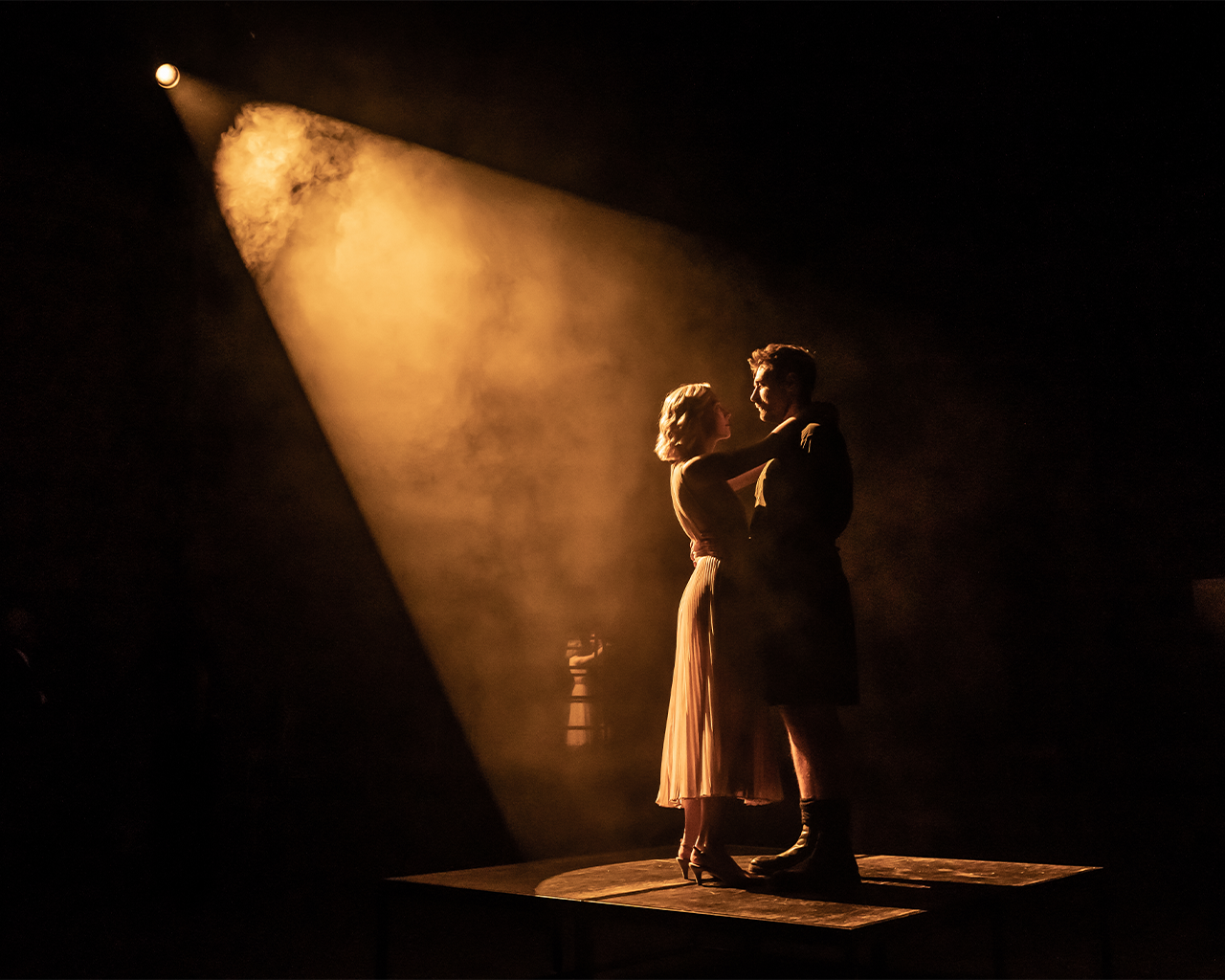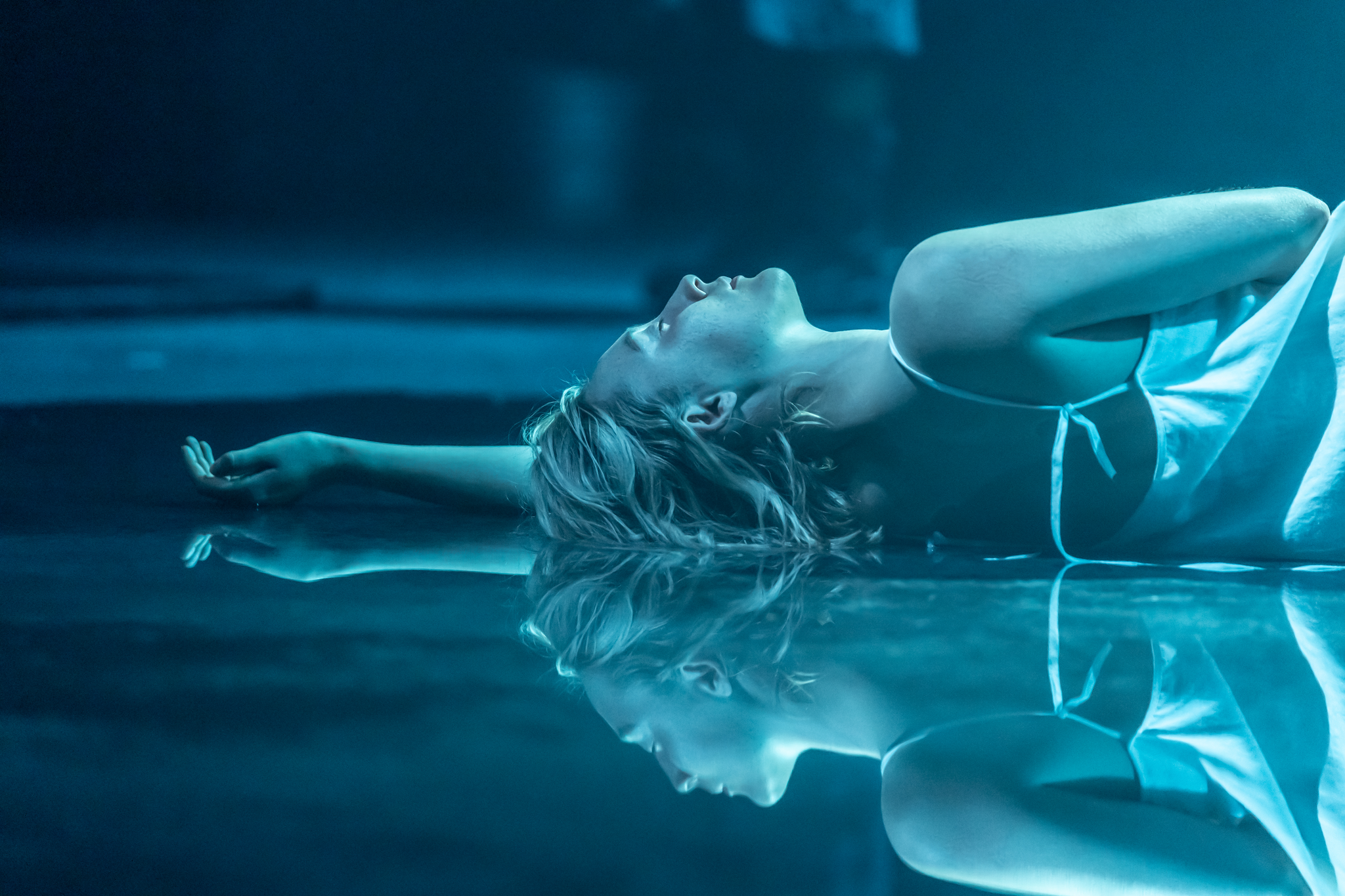

“One of the first times we met Denzel, Denzel said to Joel, ‘What about the black and the white of the thing, Joel?’” Frances McDormand told the audience before the European premiere of The Tragedy of Macbeth, directed by Joel Coen and starring McDormand as Lady Macbeth and Denzel Washington as the title character, at the final night gala screening of the London Film Festival, an audience that included Bridgerton’s dashing Regé-Jean Page wearing a black velvet tux and Tobias Menzies who played Prince Philip to Olivia Colman’s Queen Elizabeth in The Crown. Colman, in fact, was brilliant and troubling and oddly, movingly menacing in a film I’d seen earlier at the festival, The Lost Daughter, directed by Maggie Gyllenhaal. Colman, come to think of it, is kind of the British version of McDormand, both women down-to-earth divas who stop just short of earthy since they are also both smart enough to know that Anna Magnani retired that description long ago even though I’d certainly put them in the same category as the late Italian star.
McDormand had just made a loping slightly Groucho Marx-like entrance onto the stage at Royal Festival Hall, literally leaning-into the applause as a way of both acknowledging the roar coming her way while seeming to duck it at the very same time, a neat trick that fame has taught her to master. She just doesn’t seem to know how to deal with adulation, or – wait, I’m wrong – more aptly she does. It is we who don’t know how to deal with her, yes, down-t0-earth way of doing it as she, who gets to the core of all her characters by protecting her own in public contexts, even gets to the complicated core of dealing with being adored by refusing to adorn it with anything other than what it is: a way that others find to express gratitude for the work she does. It’s not about her; it’s about the work. She’s just the conduit who has to find a way to take credit for it. It is almost a blue-collar way of navigating the hoity-toity tarrying about that comes around after the work is finished. She might revel in Shakespeare – indeed, I saw her play the role of Lady Macbeth onstage a few years ago at Berkley Rep – but she has always been a bit of a Brechtian sort. Nothing prissy about her or her art. No preening allowed. She has landed in a better neighborhood where privacy has become her greatest privilege, but she will always have proletarian roots that anchor her in her down-to-earth divahood. She probably even hates being designated a diva. But there is no denying that there is something diva-like – incongruously so – in her utter refusal to traipse around in the trappings of being one. It is, I think, the embodying of incongruity that emboldens her. It is at the core – that word again – of her greatness as an actress, this American woman who can duck onto a Royal stage in London with such incongruous grace and bring to mind both Groucho and Karl Marx while doing it for I’m not sure any other actress could inspire me to use the term “proletariat.” Unlike her, I’m a bit too prissy for that. But it speaks to her everlasting, blasted allure that she can blast away the prissiness of others with the pure force of her art. It is a gift we never knew we longed to receive – which is how I feel so often when I experience her work and the innate sense of no-nonsense wonder embedded within it. Again: the work. Let’s return to her talking about it.
“Joel said to Denzel, ‘Yeah, we’re going to shoot it in black and white,” McDormand continued from the stage. “‘And I said, ‘Denzel, I know that’s not what you meant, but that’s his answer and that’s as far as he’s going to go.’” The audience laughed and then applauded, slightly missing McDormand’s cue to do so since we just don’t know quite how to respond these days to sentences that signal a sense of wit when race is brought up even if such a sentence is more deeply signaling a transcending of it for artistic purposes. Coen and much of the film’s company were there on the stage with McDormand and we got a feeling of what it might have been like on the set since she was also a producer of the film and a driving force of getting it made. She can deflect with humor even as she is making it quite clear that she is having the last word. We recognize the slyness of it even as we surrender to it – much like her performance of Lady Macbeth which is, unearthing my Colman description from earlier and making even more of a connection between the two of them, brilliant and troubling and oddly, movingly menacing. Even the famous sleepwalking scene we have always thought of as displaying her own madness to match Macbeth’s guilt-riddled mind “o, full of scorpions” is given a silent stunning coda by McDormand’s take that poses its own riddle for us to contemplate regarding the character’s oft rendered hysteria within her somnambulism. McDormand’s reading of the role seems to have made room during the discovery process of rehearsals for some of her own artful slyness to limn her take on Lady Macbeth and to have slipped that reconfigured slyness into her character’s “sleep.”

Here is McDormand, the actor and the producer, telling the audience about those rehearsals: “We had the great good fortune – Joel and Denzel and I – of working probably for about six weeks over a period of time together. So we had our scenes as the couple pretty well locked in and we kind of knew where we were going, and so then when we were able to gather our company we had three weeks of invited rehearsal – unpaid, but invited rehearsal. And everyone came, mind you. Everyone came. We really rehearsed it like a play. We sat around a table. We worked with the text. We got up on our feet. Joel taped out some of the topographical areas we were going to be inhabiting. Often not everyone was always there, so sometimes we would take each other’s roles.”
Coen also spoke from the stage before the premiere. “I would like to thank the BFI/London Film Festival for having us here tonight and giving us the opportunity to bring our version of this story back to the country that it came from,” he said. “This is the first film I have made without my brother so I was fortunate to have William Shakespeare to lean on. One of the greatest partners I have had the privilege 0f working with is cinematographer – more than a cinematographer – Bruno Delbonnel,” he said of the man who helped him sculpt this film into a black and white work of art. “And I’d like to thank my partner for the last 38 years who played Lady Macbeth when she was fourteen years old and said she would play it again for me. And then she stood next to me for the next two years and produced this movie.”
McDormand is at her commanding best in the role of Lady Macbeth. She cuts a handsome, conniving figure and is so scary in her flagitious nature because she is so quietly assured that the results of it rend her of any need for rectitude. The great acting teacher Michael Chekhov said, “An actor must burn inside with an outer ease.” And there is an outer ease to all the tasks her Lady Macbeth is burning inside to accomplish. There is a fanatical cleanliness to her unclean acts so that when she infamously washes her hands it comes not from madness but from compulsion. Washington’s Macbeth is magnificently exhausted by her and her expectations. His love for her and his deeper need to please her and live up (or down, as it were) to those expectations is his own compulsion. And yet he summons the strength to weather this woman who is more than weather; she is the very climate in which it all – the play, the characters, the audience – exists even more than the referenced foreshadowing inclemency of Scotland itself.
This lushly austere black and white film had the feel of Orson Welles’s Citizen Kane with touches of Ingmar Bergman’s The Seventh Seal and Akira Kurosawa if he had collected the sculptures of Richard Serra. I was also reminded because of “the black and the white of the thing” of Welles’s 1936 Voodoo Macbeth for the Federal Theatre Project and its all-Black cast. My fantasy of McDormand and Colman and Magnani playing the three witches was overcome by the one actress, Kathryn Hunt, who plays them all with the help of Coen’s inspired interpretation of the roles. There is a Gollum-like quality to the performance that really takes flight, as does this film along with her.

McDormand and Washington as their characters – the film and its palette sculpts his blackness and her whiteness beautifully but does not hide their ages while doing it – can seem delusional when talking about their hope for offspring in a world ruled by dynastic families. Their delusion is unsettling and rather heartbreaking. The film’s claustrophobia so beautifully manifested in Stefan Dechant’s production design is a mirror of the childless claustrophobia that their marriage has become. This is not a problem in the other production of Macbeth I saw recently at the Almeida Theatre starring James McArdle and Saoirse Ronan. It is the hottest ticket in town for good reason. Directed by Yaël Farber, it is as spatially sculpted as Coen’s black-and-white film but much more violent, its decibel level literally underscored by a cellist onstage and Tom Pane’s pulsing score. And yet time seems to be the enemy in both productions for different reasons. McArdle recently told Katie Rosseinsky at the Evening Standard that he, at 32, and Ronan, still only 27 even though she’s been nominated for four Oscars already, are able because of their ages to explore “the entitlement of our young and this need for instant gratification, instant success, instant profile or awareness. I’m not really into that but it fascinates me in others and it fascinates me about the Macbeths … If they’d done it right, they would have been king and queen in their fifties, but they were like, ‘no, we want it now,’ and without proving they have what it takes – they want the status, the adoration, everything. I know this sounds incredibly jaded, but that’s what I think of the world that we’re in.” McArdle went on to describe “celebrity shit shows” as “having a real sort of classical element to them that’s Greek or Shakespearean.” For her part, Ronan recently told the BBC that she and her good friend McArdle “keep thinking of Lady Macbeth and Macbeth as like a Kim Kardashian and Kanye West situation.” In fact, the two actors are such good friends, they share a dressing room at the Almeida and have come to call their characters in the play Neil and Susan.
All glibness aside, these two young actors glide though this tragedy with the honed talents of two old vets. It is a pas de deux that is grindingly gorgeous to behold. Farber is know for her literal fluidity as a director and by the end of the evening this tragic horror show filled with bloody heartbreak is awash with emotion – water, tears, and, yes, lots and lots of spilled blood. There is a river of revenge there on the stage. Ronan reins in her character’s viciousness but she is like a votive candle within the ritualized version of this play as she chooses instead to be lit from within by that viciousness that can’t quite be extinguished within her. The role has even been expanded so that it is Lady Macbeth, not a messenger, who goes to warn Macduff’s wife and children that they are about to be murdered and then witnesses those murders as a way of explaining her later behavior. Ronan is magnificent in that scene which has been reinterpreted for this Almeida production. McArdle, whom American audiences know from the role of Deacon Mark on HBO’s Mare of Easttown, is staggeringly good as Macbeth as he plays up those “scorpions” scraping against the inside of his skull. It is a frighteningly physical performance. If I can’t see McDormand and Colman and Magnani play the witches in Macbeth, I have another fantasy that seems more likely. I’d love to see McDormand as Amanda and Ronan as Laura and McArdle as Tom in a production of The Glass Menagerie that also would star Corey Hawkins, who portrays Macduff in Joel Coen’s Macbeth, as The Gentleman Caller.
Cush Jumbo is giving a wonderful physical performance as well in her acclaimed portrayal of the title character in Hamlet at the Young Vic, another hot ticket this theatre season in London. And yet she is never overly mannered as she so thoroughly convinces us that she is a prince. It is a modern dress production and with her slender slouch and shaved head one could imagine Hamlet with a skateboard under his arm as he hangs out with Rosencrantz and Guildenstern – now cast as a boy and a girl who take selfies of themselves in the castle and are played wonderfully by Joana Borja and Taz Skyler. And for you Game of Thrones fans, Gertrude is played beautifully by Tara Fitzgerald, who portrayed Selyse Baratheon. There is a pureness to Jumbo’s Prince of Denmark, a dignity that you sense has been dirtied by his father’s death and the alacrity of his mother’s remarriage to his uncle. Jumbo is grand in this role. It takes a mature talent and a woman deeply secure in it to tap into something so genuinely youthful and male without it being arch or succumbing to the temptation to “comment” on the maleness. This production, directed by Greg Hersov, makes you realize finally, too, it is a play about grief as much as madness.
In fact, madness might be too harsh a term for the interpretations of the characters in the Shakespeare plays I’ve seen in the last couple of weeks here in London. For the first time I realized they might be more precisely about mental illness, not madness. Lady Macbeth is a disordered malignant narcissist. Hamlet is suffering from depression that feels doubled-up on itself by grief. And Romeo and Juliet, which I saw at the Globe in its modern-dress production directed by Ola Ince, is about two teenagers who are not just hormonal but can seem at times as if they are suffering from some level of bipolar disorder which would explain the mania of their highs and their lows in the engaging performances of Alfred Enoch as Romeo and Rebekah Murrell as Juliet. But the production focuses less on their romance – I am trying to remember if they even kiss – and more on society’s ills and how it fails to come to the aid of young people in need. When the teenagers commit suicide we are less heartbroken than we are incensed by society’s failure to recognize their problems, help them, and avert such an outcome.
To circle back to Brecht, Ince uses his placard-like device of written proclamations bannered at the audience before certain scenes to tell us of these ills we face as a society. I was moved by their framing of scenes – especially since I saw it with a matinee audience made up mostly of junior high school students and these banners spoke so specifically about and to the young. Some critics, however, accused the production of being “too woke” for employing such a Brechtian device, according to Alfie Enoch, whom I interviewed after another of his matinees at the Globe. Watch for that conversation here at Grazia. But those same critics, no doubt, would have accused Bertolt Brecht of the same thing.
It at times has felt a bit sinful being here in London and seeing so much theater and reveling in culture. But is guilt itself – is feeling sinful – just a form of mental illness? Are Macbeth and Hamlet and Romeo and Juliet as much about sin – what qualifies as sinful and what is a misplaced notion of it – as they are about murder and malice and madness and mental illness? Why has society taught us to take ourselves to task for placing such importance on culture? So many of these characters’ actions are about ridding themselves of their own sinful natures, if not rending themselves of their rightful guilt. I don’t know if I feel rightfully guilty about the gobbling up of so much culture as the vulture for it that I am – even though when looked on like that I have to confess that gluttony is, in fact, one of the Seven Deadly Sins – yet perhaps writing this column is a way of ridding myself of it. Let’s once more turn to Brecht, who proclaimed, “Sin is what is new, strong, surprising, strange. The theatre must take an interest in sin if the young are to be able to go there.”
I’m no longer young.
I am seldom even really sinful.
But I thank the Muses that I still have an interest in what is new and strong and surprising and strange. Come to think of it, that is not only a pretty good mission for the theatre, but also for a magazine and its digital site. And it is what you’ll find here at Grazia. Keep coming back.








